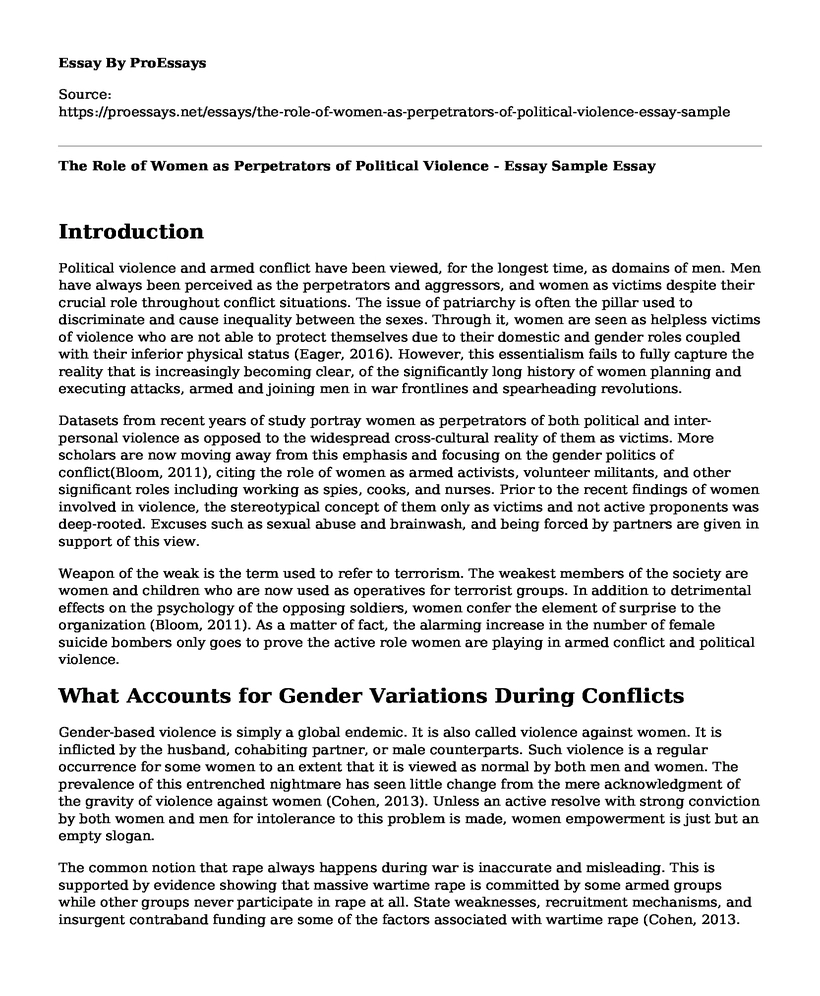Introduction
Political violence and armed conflict have been viewed, for the longest time, as domains of men. Men have always been perceived as the perpetrators and aggressors, and women as victims despite their crucial role throughout conflict situations. The issue of patriarchy is often the pillar used to discriminate and cause inequality between the sexes. Through it, women are seen as helpless victims of violence who are not able to protect themselves due to their domestic and gender roles coupled with their inferior physical status (Eager, 2016). However, this essentialism fails to fully capture the reality that is increasingly becoming clear, of the significantly long history of women planning and executing attacks, armed and joining men in war frontlines and spearheading revolutions.
Datasets from recent years of study portray women as perpetrators of both political and inter-personal violence as opposed to the widespread cross-cultural reality of them as victims. More scholars are now moving away from this emphasis and focusing on the gender politics of conflict(Bloom, 2011), citing the role of women as armed activists, volunteer militants, and other significant roles including working as spies, cooks, and nurses. Prior to the recent findings of women involved in violence, the stereotypical concept of them only as victims and not active proponents was deep-rooted. Excuses such as sexual abuse and brainwash, and being forced by partners are given in support of this view.
Weapon of the weak is the term used to refer to terrorism. The weakest members of the society are women and children who are now used as operatives for terrorist groups. In addition to detrimental effects on the psychology of the opposing soldiers, women confer the element of surprise to the organization (Bloom, 2011). As a matter of fact, the alarming increase in the number of female suicide bombers only goes to prove the active role women are playing in armed conflict and political violence.
What Accounts for Gender Variations During Conflicts
Gender-based violence is simply a global endemic. It is also called violence against women. It is inflicted by the husband, cohabiting partner, or male counterparts. Such violence is a regular occurrence for some women to an extent that it is viewed as normal by both men and women. The prevalence of this entrenched nightmare has seen little change from the mere acknowledgment of the gravity of violence against women (Cohen, 2013). Unless an active resolve with strong conviction by both women and men for intolerance to this problem is made, women empowerment is just but an empty slogan.
The common notion that rape always happens during war is inaccurate and misleading. This is supported by evidence showing that massive wartime rape is committed by some armed groups while other groups never participate in rape at all. State weaknesses, recruitment mechanisms, and insurgent contraband funding are some of the factors associated with wartime rape (Cohen, 2013. However, this crime against humanity does not always occur during war. Even on average normal days with peace and tranquility, this crime has been reported on a daily basis throughout the world. Rape patterns are widely different in terms of form, purpose, scale, and scope pre-, during, and post conflicts.
It has been reported that men perpetrate rape as a sign of the power they have over women. Studies also indicate that there is a higher probability of state forces than rebel groups to commit rape. This is regardless of whether the forces have women members or not. Therefore, the rates of sexual violence increase during conflicts.
References
Bloom, M. (2011). Bombshells: Women and terror. Gender Issues, 28(1-2), 1-21.
Cohen, D. K. (2013). Explaining rape during the civil war: Cross-national evidence (1980-2009). American Political Science Review, 107(3), 461-477.
Eager, P. W. (2016). From freedom fighters to terrorists: women and political violence. Routledge.
Cite this page
The Role of Women as Perpetrators of Political Violence - Essay Sample. (2022, Dec 09). Retrieved from https://proessays.net/essays/the-role-of-women-as-perpetrators-of-political-violence-essay-sample
If you are the original author of this essay and no longer wish to have it published on the ProEssays website, please click below to request its removal:
- Bullying and Suicide in Adolescents Essay
- The Ugly Truth of Drug Addiction Essay
- Income Inequality, Poverty and Progressive Taxation Essay
- Research Paper on The Homeless Senior Accommodation Program (HOSAP)
- Alcohol, Sexual Assault & College Women: Research Paper
- Essay Example on End Racial Segregation: Fedearal Government Actions to Solve Racism
- Essay Sample on Binge Drinking Among College Students: Causes & Consequences







